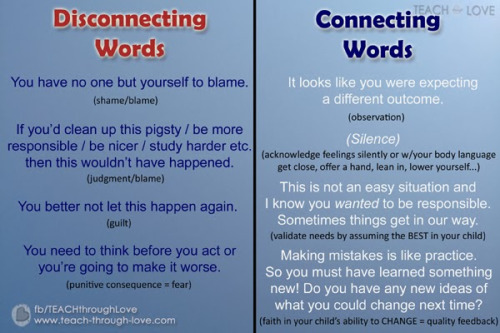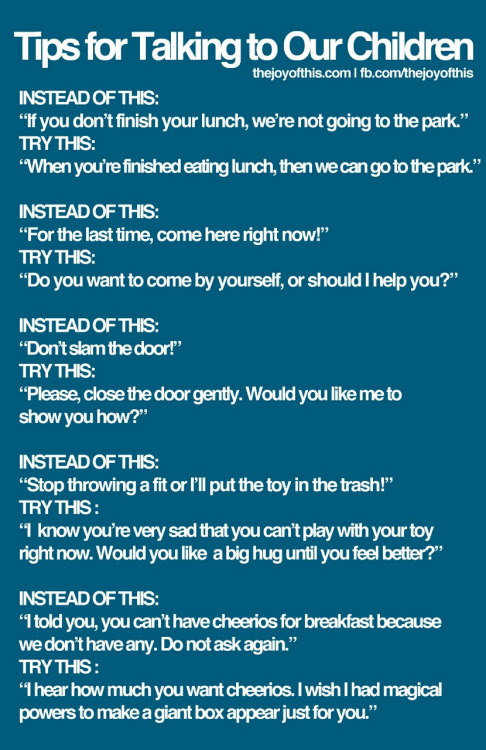Quoted from taliaitscoldoutside
Regarding teaching morals to a child
Make it clear and simple. Black and white. Introducing gray too early will confuse them. Gray is important, but they won't be ready for it until they reach adolescence, and even then just a little bit at a time. I think this is why religion is so effective. Simple rules and boundaries to follow for being a good person are useful.
Tips for respecting children’s spaces, competence, and general existence from a preschool teacher:
- Listen to them
- Ask them, “Do you want to say hi to your auntie/grandma/cousin/dad/whatevs” (Hint: they will be honest and this can result in a simple hello or a hug or a silly “No!” depending how comfortable they feel)
- If they don’t want to hug you realize it’s not that they don’t love you it’s that they don’t know you/don’t feel like hugging.
- Just like every other person who doesn’t want a hug
- In the event that you need to move a child EXPLAIN TO THEM WHY and WHAT YOU ARE DOING don’t just move them like PROPS they are CHILDREN and NOT props
- For instance, “I’m going to move your chair over so we have room at the table for everyone!”
- Or “Sorry there was a person running by I didn’t want you to get smushed so I had to pick you up!”
- Remind them that they are people not objects using your actions
- Asking children to do something they don’t want to do but NEED to do often doesn’t work, instead give them a choice, “Do you want to eat bok choy or yams?”
- NOT “Do you want to eat your vegetables?”
- “Do you want to brush your teeth in the bathroom or the kitchen”
- This exercises their ever-growing free will and is especially useful during TERRIFIC TWOS okay TERRIFIC not TERRIBLE they’re TERRIFIC
- Children will copy you, MODEL FOR THEM
- Being over enthusiastic IS beneficial for them understanding emotional and social competence
- “I hung this picture uneven, that makes me sad, hmmm! Oh goodie, I found my mistake! Now I can fix it, I’ll feel much happier when I’ve fixed it!”
- You think it sounds ridic yeah well hearing you do that children around you just learned to not get so discouraged by their mistakes and that it’s okay to try to fix them
- ADULTS CAN APOLOGIZE TO CHILDREN
- You make a mistake that hurt a child, APOLOGIZE and show them how to do it properly and genuinely
- Realize children are fully competent and are capable of making meanings from YOUR implications about race, culture, gender, ability, sexuality, EVERYTHING
- Many three year olds know what the N-word is, what gay means, can identify which children are visably disabled, and YOUR REACTIONS of their answers of questions about their culture
- Children like to talk about themselves so do not ever dismiss what they say about themselves as illegitimate just because it sounds silly or unlikely sometimes it’s true
- Stop talking about how you hate children, just leave them alone if you don’t understand them you don’t have to be complete jerks to PEOPLE you’ve never met
- I will post more and if people have question PLS ASK ME I WOULD LOVE TO ANSWER WHAT I KNOW
This is spot on. 10 years as a nanny and this is pretty much what I did. Also guiding them with questions to help develop critical thinking skills:
- “Yes, it does look like fun to climb on top of your cozy coupe, but what do you think might happen if you climb on something with wheels?”
- “And if it rolls away with you on top, where do you think you might go?”
- “What do you think it would feel like to fall off and hit your head?”
It might sound patronizing but children’s prefrontal cortices develop last, and this portion of the brain allows us to think critically, plan, and exercise self control. You can’t expect them to understand the consequences of their actions right off the bat, but using questions helps them to move through, step by step, potential outcomes of their behaviors.
Oh, and praising good behaviors instead of just applying labels:
- In addition to “you’re a great climber!” try “Great job figuring out how to climb to the top of that wall! You saw that your arm couldn’t reach the next handhold so you used your legs to push yourself up instead!”
- or in addition to “you’re a talented singer” try “I’m proud of how hard you’ve worked to learn that song. You stuck with it and kept trying until you memorized it and could do it exactly how you wanted.”
Regarding code words
Quoted from enernies-with-benefits
When i was a kid my mom and i had a code word to let her know when i needed her to say no. For instance if a kid at school asked me to come over and stay the night but i really didnt want to, id call my mama and ask her, and then end it with “please, Mom?” I never call my mama Mom, just Mama or Moomoo, so she would know immediately to say that I was grounded or had too much homework or some other bullshit. We also had a system the other way around, so if i called her to see how her date was going and she needed an out, she would call me babydoll and id tell her i heard scary noises and was frightened and needed her to come home or something.
Anyways, my point is that every family should hqve a system of codes to keep them safe. Go do that.
Regarding young people
You want your kids' world to be better than yours, right? So doesn't it follow then, that if you're a good parent and your kids evolve to be smarter than you, they're gonna make you feel dumb?
So if you feel stupid around young people, things are going good!
Regarding school mental health
Allow mental health days for your kids. Allow them to have a certain number of days per semester where they can ask to stay home, no questions asked.
Regarding honesty
When a child is punished for their honesty, they begin to lie.
Regarding sending kids off to bed
“There’s a monster under my bed!”
“Yes. He watches over you at night and chases away your nightmares.”
“There’s a monster in my closet!”
“Yes. She loves the smell of the laundry detergent I use, and she’s busy trying to organize your shoes.”
“There’s a monster under the stairs!”
“Yes. She collects spiders and he makes sure you don’t trip while going to get water.”
“There’s a monster right outside my window!”
“Yes. He’s pulling weeds from the garden and protecting us from burglars.”
“There’s a monster behind the couch!”
“Yes. He’s eating all the crumbs you left behind and hiding pennies in the cushions.”
“Oh. Then good night.”
“Good night, Dear.”
Regarding communication
Idea: Set up a box where my kids can write notes of things they're too uncomfortable to talk to me in person about. Have a checkbox for whether or not they want me to respond.
Regarding phrasing


Regarding chores
Change the wifi password regularly. The password can be earned by doing chores.

